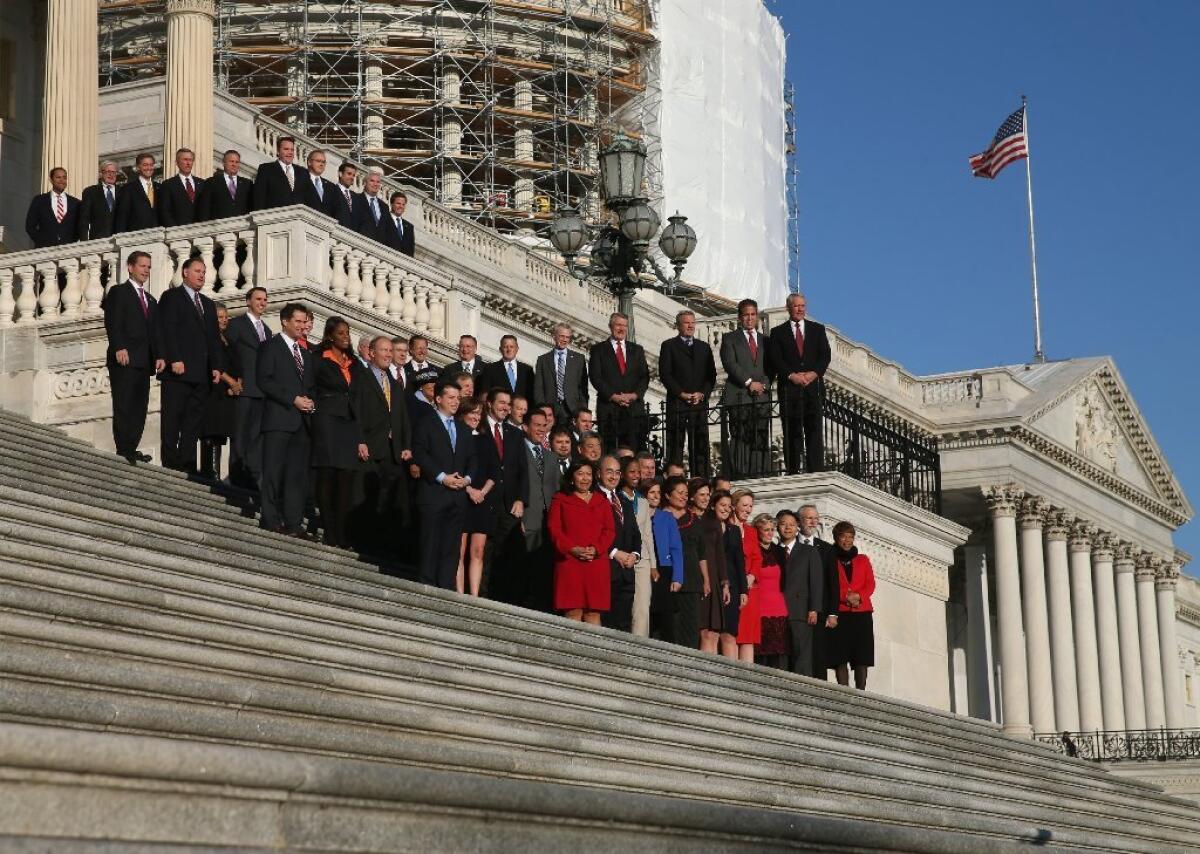Op-Ed: A simple way to fix gridlock in Congress -- change committees

- Share via
As Washington prepares for the opening of the 114th Congress, the capacity of our national legislature to address the nation’s problems is in doubt.
Public approval of Congress hovers near historic lows. The contrast between Congress’ bare ability to pass routine legislation and President Obama’s willingness to act unilaterally suggests that the White House may supplant Capitol Hill as the nation’s chief policymaker. Yet bold reform proposals to reverse Congress’ slide — by overhauling laws governing campaign finance, redistricting or elections administration, for example — have wilted in the face of entrenched interests.
There is a far simpler measure reform-minded members of Congress should consider: Replace the committee selection process and seniority rules with a system in which legislators are assigned to committees via a random draw. This straightforward reform, requiring nothing more than a change in each chamber’s rules, would go a long way toward restoring Congress’ power and relevance.
Committees are where much of Congress’ work gets done, where legislators debate technical language in bills and horse trade. Committees shape the legislative agenda, deciding, with limited exception, which bills the floor may consider.
Congress’ practice is to allow the two parties’ leadership-controlled steering committees to assign legislators to committees, which gives the leadership leverage over rank-and-file members. Breaking party leaders’ hold on committee assignments would reduce the pressure legislators feel to vote the party line instead of their personal or district preferences.
Random assignment also would lessen members’ fundraising loads. Research by University of Wisconsin political scientist Eleanor Neff Powell has demonstrated that, in doling out favored committee assignments, parties emphasize the amount of money that legislators have raised and given to their fellow party members. A 2007 leaked memo from the Democratic Congressional Campaign Committee to party representatives laid bare the quid pro quo, stating that Democrats leading key committees must pay the party “dues” reaching into the mid-six figures. If committee assignments were random, politicians would still be money raisers, but at least one key element from the sweepstakes would be removed.
Additionally, with few ways for members to maneuver for plum committee assignments, the quality of committee work would improve. My research, for instance, shows that individual members of Congress are loath to engage in the painstaking work of oversight, despite the collective benefits to Congress of active House and Senate governmental affairs committees and subcommittees. With random assignment, legislators who desire to have any influence at all would be compelled to focus their attention on their committee work.
Perhaps most important, committees with randomly assigned members would be more likely to draft bills that reflect the broad preferences of Congress, and could therefore actually make it into law. The process would encourage compromise and dampen the influence of special interests.
How? A random draw would by its nature mix representatives from divergent backgrounds and with differing ideologies and compel them to interact. No longer would legislators from farm states be able to cluster on the agriculture committee, defense hawks on armed services. With a broad sample of viewpoints represented, we should see committees producing bills that are more closely aligned with the views of Congress overall. Congress, once again, could regularly pass laws.
Certainly, random assignment would have some downsides — committees would lose some expertise along with their “special interest” members, for example. But expertise is fungible. Consider New Yorker Shirley Chisholm, the first black woman elected to the House of Representatives. She was placed on the House Agriculture Committee (by party elders hostile to her, she said in her autobiography). At first, she was despondent — what did agriculture have to do with her urban district? But with no alternative, she found a way, focusing on the USDA’s food stamp program, and becoming an authority on policies important to her constituents and her committee.
As good an idea as it may be, how feasible is changing the committee system? The status quo has powerful adherents. What successful politician would want to rock that boat?
And yet, history shows that, when Congress’ legitimacy is strained, members are willing to make changes. In the mid-1970s, following the Watergate scandal, Democrats banded together with Republicans to weaken the seniority system in committees and reduce the role of money in congressional elections. Both reforms hurt incumbents. Yet legislators acted, enhancing Congress’ stature even though they made their own reelections more difficult.
Congress may be at a similar moment. Even a self-interested politician can see there are few benefits to serving in an institution with little public prestige and a chronic inability to pass laws. When legislators return to Washington this week, they should make a change for the better and reform the way committee assignments are made.
Brian Feinstein is an attorney in Washington. His research on congressional committees has been published in the Journal of Law, Economics & Policy.
Follow the Opinion section on Twitter @latimesopinion
More to Read
A cure for the common opinion
Get thought-provoking perspectives with our weekly newsletter.
You may occasionally receive promotional content from the Los Angeles Times.









